Diversity Matters in Movies
Not only has Whiteness been perpetuated in Hollywood but through the White Savior genre, Whiteness is deified. The White Savior genre can be defined as a plotline following the character development of a likeable but flawed White character, with varying levels of being culturally challenged, who engages in interactions with a non-White person or group, helping to achieve their goals and in the process becomes a more aware and better person. In the past, it was no surprise that these types of Hollywood movies were popular. In a White male dominated culture, Hollywood has always made movies for and about White males who controlled the types of movies they were willing to pay to watch.
A Win for Women
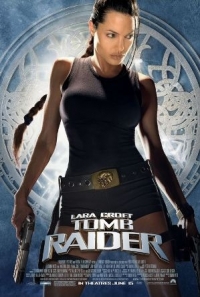
Over the last few decades, with the rise of the feminist movement, moviemakers in Hollywood recognized that there was a market for movies produced, directed and acted by women. Producers also realized that White male audiences were appreciative of strong White female characters. Of special note is the transformation of Sarah Connor’s character from shy and sheltered in Terminator 1 (1984) to warrior woman in Terminator 2 (1991). The White female action hero was successfully spawned as evidenced by Lara Croft, Tomb Raider (2001) and found more recently, in Katniss, Hunger Games (2012). Both movies helped catapult their female leads to stardom. While some may argue that the female action hero is still being sexualized, the same can be said for male action heroes. If White female characters have been able to break the celluloid glass ceiling in Hollywood movies, why have non-White characters lagged behind?
White Saviors and Oscar
Movies are a celebratory, vicarious experience in which audiences can escape into and participate in the choice of their ride, be it a sober documentary or a thrilling action adventure. Unsurprisingly then, White Savior movies that may assuage White guilt, have led the way in winning awards. In the 2013 article, “Oscar Loves a White Savior,” David Sirota observes that over the last 25 years, a whopping 10 White Savior movies have won major awards and that if a movie depicts people of color following a White Savior, an Academy Award nomination will soon follow.

Mississippi Burning (1988) is a movie about the civil rights struggle in the South. Three organizers of the movement, James Chaney, Andrew Goodman and Michael Schwerner, who attempted to register Black voters, were murdered by the KKK. Mississippi Burning stands out in the White Savior catalog because the FBI is portrayed as a force of moral rectitude and the director, Alan Parker admitted, “because it’s a movie, I felt it had to be fictionalized. The two heroes in the story had to be white. That is a reflection of our society as much as of the film industry. At this point in time, it could not have been made in any other way.”(1) In other words, the screenplay disappointingly did not focus on the civil rights activists who heroically gave their lives to fight for the voting rights of African Americans.
Plus ca change plus ca meme chose
But that was back in 1989. Surely times have changed. Not! Recently, Avatar (2009), another White Savior movie, won four Oscars. Blindside (2009), a Christian themed female White Savior movie that portrays a stereotypically affluent White Christian family that helps a stereotypically poor Black boy eventually achieve academic and professional success through their helpful intervention, was nominated for and won numerous awards. Not the least of which was an Oscar for Best Actress. Who could have predicted in 2009 that in the liberal bastion of Hollywood, Los Angeles that a movie with Christian undertones would be honored by the Academy Awards? Hollywood is not known for its social conservatism but rather for pushing the envelope in challenging the social mores of the time. So why the prolonged reticence towards racial inclusivity?

Despite commercial and critical success, movies with non-White protagonists continue to be treated dismissively by the Academy. Even when films like Slumdog Millionaire (2008) with non-White protagonists are acknowledged, all 10 Oscar nominees and all 8 winners were White, except for the music category. Life of Pi (2012), nominated for 14 Oscars, won 4 with Ang Lee being the notable exception in winning for Best Director. Fast forward to 2014’s civil rights movie that rivetingly portrayed how Martin Luther King Jr. and the African-American leaders perspicaciously chose Selma, 50 years ago, as a strategic site to advance the civil rights cause. Yet, Selma was snubbed at the Oscars, again save for a music win. This year, Academy nominations for Creed (2015) omitted any non-White members of the production. 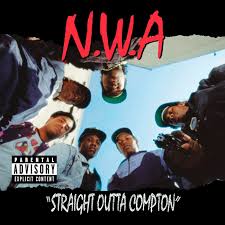 Straight Outta Compton (2015), a biography about the influential N.W.A. on West Coast hip hop/gangsta rap did not even make the Academy music award cut, despite receiving positive reviews from music critics and winning numerous music and film awards. It appears that Brent Staples comment back in 1989 that “movie people seem to believe that whites would be alienated by serious dramatic films with black principals, no matter how compelling the story lines,”(2) was prophetic. In fact, 2015 was noted as the Whitest Oscars since 1998. Interestingly, not only were no people of color nominated, neither were any female screenwriters, directors or cinematographers. (3) The same trend continues in 2016. One small step backwards for movies, one huge leap backwards for humanity.
Straight Outta Compton (2015), a biography about the influential N.W.A. on West Coast hip hop/gangsta rap did not even make the Academy music award cut, despite receiving positive reviews from music critics and winning numerous music and film awards. It appears that Brent Staples comment back in 1989 that “movie people seem to believe that whites would be alienated by serious dramatic films with black principals, no matter how compelling the story lines,”(2) was prophetic. In fact, 2015 was noted as the Whitest Oscars since 1998. Interestingly, not only were no people of color nominated, neither were any female screenwriters, directors or cinematographers. (3) The same trend continues in 2016. One small step backwards for movies, one huge leap backwards for humanity.
Cross-racial Casting

Another issue is that White actors are often chosen to play non-White characters in true to life inspired stories. One of the most famous examples is Ben Kingsley, of mixed heritage, when he played Gandhi in Sir Richard Attenborough’s film with the same name in 1982. Given the movie’s content on the eventual demise of Britain as a colonial power as India struggled to gain independence through Mahatma Gandhi’s efforts, Kingsley’s casting is ironic. In A Beautiful Mind (2001), Alicia Nash, who is from El Salvador, was portrayed by Jennifer Connolly, not from El Salvador. Her story as one of the few female physics students at MIT in 1955, who sacrificially gave up her career to take care of her schizophrenic husband, John Nash, forms a compelling story of its own even though she was relegated to the sidelines in A Beautiful Mind. Both Kingsley and Connolly, playing cross-racial roles, won Oscars for Best Actor.
Cross-racial casting continues to be factor evidenced by the movie Exodus: Gods and Kings (2014). Director Sir Ridley Scott defended his casting choices by citing funding challenges for non-White leads. Scott argued, “I can’t mount a film of this budget, where I have to rely on tax rebates in Spain, and say that my lead actor is Mohammad so-and-so from such-and-such. I’m just not going to get it financed. So the question doesn’t even come up.”(4) The director did not even trouble to defend his choices by saying that Christian Bale, an excellent actor, was chosen for being the genuinely best choice for the role of Moses. The upcoming Gods of Egypt (to be released in 2016), has faced similar criticisms with an all White male cast. Responding to the negative feedback, Chadwick Boseman, an actor who is African-American, was chosen to play the god Thoth. An apology was also issued by the Lionsgate production house after considerable backlash, demonstrating the power of audiences and critics in influencing the direction of inclusive cinema.
Trends in Television

In the last couple of years television has proved to be a more fertile ground to plant the seeds of diversity: Maggie Q’s (2010) Asian revamped Nikita, Pryanka Chopra’s (2015) Indian headlined Quantico and Trevor Noah (2015), as South African host in The Daily Show. Let’s not forget the diversity represented in television’s Marvel universe, gay, straight, Black, White, male, female, Asian and multiracial. TV producers are aiming their shows for a global audience and getting it. Quantico has been translated in 44 languages and is being seen around the world. Hopefully, the trend towards inclusivity will continue and it won’t be a two steps forward, three steps backward scenario as in the case of Hollywood movies.
Will Oscar Become Obsolete?
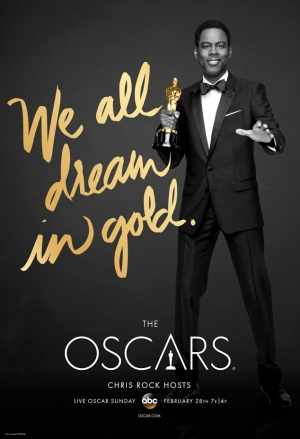
Promisingly, the 2016 People’s Choice Awards winners were much more diverse than the Academy Awards. Pryanka Chopra broke ground as the first Indian to receive a People’s Choice award. Vin Diesel, Kevin Hart, Nicky Minaj, and Selena Gomez also won awards to mention a few diverse winners. In recent years, Oscar ratings have been declining as “a dearth of diversity among nominees and unfamiliarity with some of the most honored films may have contributed to the lower tune-in for the 2015 Oscars.”(6) On MLK’s birthday, January 18, Jada Pinkett Smith and Spike Lee both posted tweets using the dreaded B-word: BOYCOTT. Will having Chris Rock host be enough to soothe the ire of boycotters and capture a sizeable market? Will having a token African-American host boost ratings? Declining Academy Award viewership will ultimately lead to lower revenues and if the Oscars hope to stay relevant, they should plan to target an international audience.
Films For Diaspora
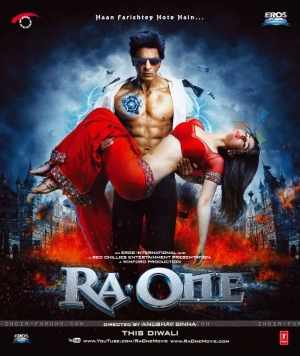
But, why pick on Whitewashing in Hollywood? When was it commanded for movies to worship at the altar of diversity? What about movie industries around the world such as Nollywood (Nigerian movies) and Bollywood (Indian cinema)? Do international movie production houses care about inclusivity? Since the 1990s, Bollywood producers have been making films in global cities such as London, New York and Paris as well as more exotic locales like Malaysia, Switzerland and Greece. Over the last 20 years Bollywood production companies have courted their overseas markets and incorporated themes that deal with issues faced by Non-Resident Indians (NRIs). Today, sci-fi flicks Ra.One (2011), super-hero action stories Krissh 3 (2013) and historical dramas Bajirao Mastani (2015) are made with NRI dollars in mind.

As diversity increases around the world, there is a diaspora audience consisting of various ethnic groups that can form potential international markets. Asian action films such as Legend of the Drunken Master (1994), Crouching Tiger, Hidden Dragon (2000), Hero (2002) and Ip Man (biography, 2008) give credence to the idea that there is a solid market for Asian movies in the West. Also worth mentioning is the long held enduring popularity of Japanese anime. There is a growing presence of international language films at local theatres in larger urban centers. Satellite television as well, has opened up a virtual portal of endless multilingual entertainment. The technology is now available to view awards shows in any country and any language of choice with English subtitles, if required. It may be possible that international awards shows could increase in importance and status for an actor’s career in terms of reaching a global audience. International awards such as the Caanes Film Festival held in France and the International Indian Film Awards (IIFA), held in various cities around the world every year, demonstrate that there is a global appetite for films with diverse narratives.
The Future of Films
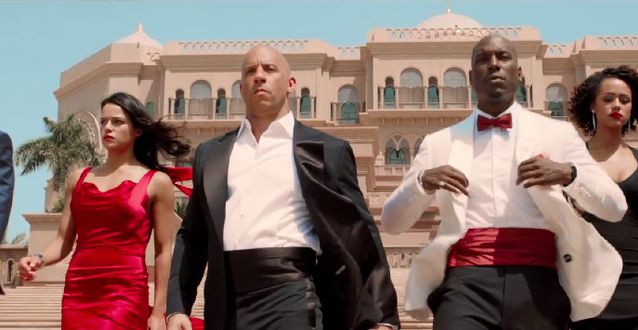
At the end of the day all producers, Hollywood, Bollywood and Asian, aim to give audiences movies that will bring in profits, great profit$$. If audiences value diversity then they will strategically choose to see movies which have multicultural casts. An example of a possible wave of the future is the Fast and Furious 14-year franchise with its diverse cast attracting not only global audiences over a decade, but in the latest installment garnering 49% of a female audience, unusual for an action movie.(5) As more movies are released worldwide and relating to international audiences becomes the norm, it is likely that Hollywood will offer more diverse lead roles, especially when producers are racially diverse. Vin Diesel, was brought on board to produce the fourth installment of Fast and Furious after audience numbers declined in the third installment. A two-tier audience marketing strategy may develop as production houses attempt to cater to their national audiences and also expand to the global market. Ultimately, international movie fans will control what types of movies, monocultural or multicultural, are made in the future.
Critical film analysis offers a perspective on whether progress has been made in perceptions of society’s racial divides. Meaningful dialogue can be sparked on why Whitewashing film productions through screenplays and cross-racial casting are perpetually rewarded and awarded, while diverse cinematic contributions are dismissed. It will be interesting to see how producers and audiences respond to the globalization of movies. Directors and producers have passed the buck, literally, in terms of explaining why they Whitewash lead characters as giving audiences what they want. If a large number of viewers decide to boycott the Oscars, then cinematic decision makers will be challenged to rethink their assumptions about audiences as to whether instead of perceiving a need for Whitewashing protagonists, there may be a need for inclusivity among lead roles in the future. To paraphrase MLK, let’s look to a day when movies will not be judged by the color of their skin, but will be judged by the content of their plots. Because diversity matters in movies.
This article is dedicated to the great civil rights leaders from the 20th century: Mohandas K. Gandhi, Martin Luther King Jr. and Nelson Mandela. May they inspire a new generation of activists in the 21st century.
Works Cited
- http://www.salon.com/2013/02/21/oscar_loves_a_white_savior
- http://www.salon.com/2013/02/21/oscar_loves_a_white_savior
- http://www.thedailybeast.com/articles/2015/01/15/the-whitest-oscars-since-1998-why-the-selma-snubs-matter.html
- http://screenrant.com/exodus-gods-kings-race-controversy-ridley-scott
- http://variety.com/2015/film/news/furious-7-fast-and-furious-franchise-box-office-growth-1201466622
- http://variety.com/2015/tv/ratings/oscar-ratings-abc-telecast-down-10-in-overnights-to-four-year-low-1201439543
What do you think? Leave a comment.











The only opinions that count are those expressed at the box-office.
I’m a big fan of world cinema, and I’ve noticed some trends:
Chinese people tend to star Chinese people.
Indian films tend to star Indian people.
Japanese films tend to start Japanese people.
Brazilian films tend to star Brazilian people.
Thai films tend to star Thai people.
Nigerian films tend to star Nigerian people.
…
The whole industry, worldwide, is thoroughly ist!
Thank God someone has said something sensible on this – at the end of the day Hollywood is a vapid studio centric industry that cares more about filling seats than the characters or plot.
Cheryl Boone Isaacs, is the first woman of color to hold the highest position as President of the Academy of Motion Picture Arts and Sciences; nonetheless, it is interesting to ponder how this reflects or deflects the current and last year’s selection of Oscar nominees.
You would think after so many years, we would be past this. I find that cross racial casting is such a huge thing in film. It even rings true for minorities to act as if they are not a minority. (i.e.) Jennifer Lopez in “The Wedding Planner, although she is Puerto Rican, played a Caucasian woman, more precisely an Italian woman.
Excellent point. Thanks for sharing! The more I researched this topic, the more evidence I found that we are definitely not past anything. There were so many examples of weird cross-racial casting choices, White Savior movies and Whitewashing of screenplays that all three points could be extrapolated on in articles of their own.
I am a huge international movie fan, so personally am not really sympathetic to what the Academy is so hung up on. There is a ton of entertainment in all languages, so I can’t imagine limiting myself to just Hollywood.
Good tackle of this topic.
In the end its about who actually goes to the cinema and pays for a ticket.
You can be politically correct,but you also have to be economically viable.
I rarely go to the cinema, maybe once a year.I prefer to wait and watch in my own home on DVD.
Black people tend to be massively overrepresented in both the USA and UK films, but South Asians are barely represented at all in both countries.
Hollywood is make believe.
No wonder we are where we are.
Really interesting article and very well researched. You make a lot of good and fair points! I really find that I have to actively seek out films that don’t traditionally feature the typical white, heterosexual lead. Whilst I am not outrightly denying or refusing to watch these films, I want to make sure that I don’t only watch those kinds of films and I often encounter that I have to make a bigger effort to see films that feature a more diverse story.
Although, you do suggest that Ben Kingsley is white because of his cross-racial role as Gandhi (and he also played a Sikh character in ‘Learning to Drive’ more recently). You mention he is of mixed heritage, but personally I don’t really see it an issue that his half Indian heritage makes it problematic for him to play someone Indian – specifically of Gujarati heritage, like Gandhi. His birth name is Khrishna Banji and Ben Kingsley was a stage name he used to get more auditions when he first started acting. I’m just not completely sure that he’s a good example for cross-racial casting.
The debate surrounding the Oscars nominations often leads to a discussion of opportunity and I hope that because of the huge amount of attention that this is receiving it will cause film producers and financiers to actively provide more opportunities to those of black, asian and ethnic minority so that we can have better representation that is a truer reflection of the society we live in.
Thank you for your well-informed remarks. Your point about cross-racial casting is well-taken and was previously pointed out to me but I did not edit out this point in the hopes of fostering dialogue.
I also chose to leave BK as an example because he won an Oscar for his role. A few million shy of a billion Indians and there was not one Attenborough could have casted as Gandhi. Really?? Would an Indian citizen playing Gandhi have won an Academy Award much less be nominated? I do believe, with all due respect to BK who did an amazing job as Gandhi and is a fantastic actor, that Attenborough was political in his choice of casting, specifically racially political.
I agree with you about finding international movies at the theatres is a bit more challenging but with Netflix, B4U (Bollywood) and BET, it is getting easier on TV. I think it’s great you make the effort. Kudos to you!
Basically, better roles need to be created for all people. We’re all sick of the same typecasting! Production teams should be aware of the fact that audiences want diversity, and just because movies have made a lot of money sticking to the status quo, doesn’t mean they should continue to be created that way.
Excellent article. I think there’s something to be said about the perpetuation of whiteness. However, it seems like the public is given the movies that they deserve and ask for. The approval of whiteness comes in the form of the almighty dollar. People are willing to spend money on these movies because they want to see these people on screen.
At this point in my life, I feel like I don’t believe that people look to movies to be told a story that comes out of nowhere. They want to see a story in a way that they want to see it. Movies are not about showing real life. They’re about encountering situations and themes in a way that we want them to be portrayed.
I would also like to add that this article should also mention ableism in hollywood. It’s reprehensible that people love movies like Rain Man and Forest Gump where actors pretend to have disabilities. The characters are charismatic individuals who lack real experiences of individuals who deal with disabilities.
I would like to finish by saying that movies aren’t there to represent equality or how life should be seen. Movies are there to entertain and to make us think. But movies won’t show us how life is. There is no such think as a ‘true story’ in hollywood. When we go to the movies, we should take them for how they are. We don’t ask paintings to be more socially inclusive. I don’t believe we should be expecting movies to either.
Agreed about ableism in Hollywood. The person who submitted this topic asked why Whiteness was perpetuated in Hollywood so I tried to respond by showing how assumptions made by producers, Whitewashing screenplays and cross-racial casting contribute to enabling the White Savior theme. I also tried to make the point that the Academy dismisses contributions made by non-White players in the movie business despite commercial and critical success. I wanted to stick with the topic so did not cover ableism. But that would make a great topic and perhaps you could write on this if you feel passionately about it.
I also agree that it is not producers’ job to promote inclusion in society. My point is that the producers may be missing out on a global market by sticking with the status quo. In other words, their loss. Production houses that aim for a global market that is inclusive in the end may see more profits, which I do believe is the purpose of making movies as well as making artistic contributions.
Over time, I believe that audiences will acquire the appetite for more sophisticated characters and stories. Just as women’s roles over time have evolved, I look forward to seeing more diverse complex characters. Thanks for your input!
What are your thoughts on Joseph Fiennes playing Michael Jackson?
Hollywood. Name a famous British black actress on currently on TV? In the last 5 years? Last 10? Name any in a leading roll? Ever? Stop looking over there, when over here is far worse.
Hollywood is a business – it’s there to make money. It has no moral obligation to reflect society.
I think next to all the violence and capitalist propaganda pumped out by Hollywood, diversity is almost a side issue. You could remake Batman or Dirty Harry with Korean lesbians in the lead roles, but they’d still be psycho right-wingers killing people to protect the status quo.
Morgan freeman seems to have been in every film made in the last 5 years.
There’s plenty of characters with stories to tell from all walks of life outside of your average multiplex, if you want representation look for it, nobody seems to have a problem looking up music on an indie label, why the laziness when it comes to cinema?
Small production companies can appeal to smaller audiences that seek ethnic diversity…like cable/subscription companies have proved in America. Small is beautiful.
Thanks for your insightful comments! I have heard so much about how this conversation takes place but nothing is done. Some people think the Oscars are the symptom but not the problem. But for sure they are part of perpetuating the problem.
Really deep analysis : )
Thanks for the comments!
Reena, I hear you! I am from Canada and Canadian TV and the awards (Gemini, Genie and Canadian Screen) distributed here have even a greater lack of representation given that Toronto is always being touted as a multicultural city. Even though the Toronto International Film Festival is supposed to be international, Hollywood dominates. The one TV show with any diversity was a comedy called Little Mosque on the Prairie.
I agree with you though about no point in looking at Hollywood when we can all look at ourselves first. Very true.
The issue should be less about race representative quotas in the film and television industries, and more about encouraging acting amongst non-Whites who are often not given the opportunity to pursue creative goals due to their backgrounds
I wouldn’t bother going to the Oscars if I worked in movies. Its become more political than talent and worthiness.
Speaking of diversity, why is it that there has not been one gay character in either the Star Wars or Star Trek franchises.
WOW!!! All really excellent points. Thank you.
I think Joseph Fiennes playing Michael Jackson could spawn a new genre of cross-racially cast movies known as Absurd Surrealism. Munjeera
Surreal humour (also known as absurdist humour) is a form of humour predicated on deliberate violations of causal reasoning, producing events and behaviours that are obviously illogical. Constructions of surreal humour tend to involve bizarre juxtapositions, non-sequiturs, irrational or absurd situations and expressions of nonsense. (Wikipedia)
Another messed up thing in racism: there is a hierarchy. When Hollywood want to cast a handsome south Asian, they cast Hispanics of European descent. Case in point: divya from the social network was played by a Minghella and navid from 90210 is played by a Steger.
As long as we have classes, we shall have antagonism between those classes, capital works to create greater contradiction between those classes as it forms power structures to which certain classes, by sheer good fortune of birth, are born to. The racial characteristic of antagonism between classes is incidental to the power structures of capital that lend one class power over another. Therefore we must make class differences obsolete, and the only way to do this is to eradicate power structures autonomously created by capital, as these power structures will invariably throw one group up into stardom and deification, and one group down into the ever expanding working class.
Naturally, as all ruling classes throughout history have done, the classes benefiting most from capital will impose their rules on everyone else, in the case of cinema, it is quite unsurprising that the influence of white capital has produced general white cinema, and that other classes (made more visible by racial differences) are occluded, and lobotomised from society – any mention of them is distasteful, and not compatible with the ruling classes’ notion that everything is fine, and that the way society is is THE BEST way for it to be. Therefore other classes endure something worse than criticism, they are forced into silence.
In order to change this, we must only change the social characteristic of property ownership (as yes, property ownership is nothing more than a social construct.) Not for the shelf stacker, or the taxi driver, but for those who use capital to abuse others, to enslave them to debt and work, to allow the profits from social work (such as making a film) to be privatised most heavily into their pockets, rather than spread equally.
For unless the power structures that create class differences are altered, there will always be some who have got power, and those who do not, and hitherto the history of all suppression and exploitation continues, and you will be writing the same article in 50 years.
Thanks for your insightful comments! I have heard so much about how this conversation takes place but nothing is done. Some people think the Oscars are the symptom but not the problem. But for sure they are part of perpetuating the problem.
Really deep analysis : )
“Declining Academy Award viewership will ultimately lead to lower revenues and if the Oscars hope to stay relevant, they should plan to target an international audience.”
Agree. For starters they should scrap the Best Foreign Language Film category and include the year’s most critically acclaimed non-English speaking films in the Best Picture category.
It’s important to note that the academy is made up of mostly white males, so of course they are going to favor and relate to films that feature a white, male protagonist that are told and created from the limited perspective of white male creators. We really need to look at the bigger picture of opportunity for anyone who doesn’t fill that archetype in the film industry, and then we will have so many more interesting stories and characters to portray. Great article.
Thank you Nancy. I really hope that diverse stories are not only made but recognized and validated by the Academy in the future.
There has been a lot in the way of what people call white-washing in films. This is also included in such movies as the planned live-action adaptation of “Ghost in Shell.”
Thanks for the info Kevin.
I found this review fascinating. Particularly the section concerning women and sexualisation – I agree that this is very apparent, I would suggest that it occurs a lot more often than it does with men in Hollywood.
There has also been much dispute concerning non- transsexual actors acting in transsexual roles, i.e. Eddie Redmayne in The Danish Girl. However after seeing the film myself I found it to be an outstanding performance, but I know little of the transsexual community – therefore I cannot prove reliability of his performance. I understand the dispute transsexual actors have against not being accepted obvious roles like this. On the other hand, Redmayne appears to have opened his eyes to the transsexual community and not necessarily act as a role model but as a supporter.
I think roles need to be a lot more diverse, with appearance not taking a huge aspect in choosing actors. I think this article considers this very well.
Thanks. I didn’t have a chance to go too much into diversity issues because the topic suggested was about race. It would be good to look at sitcoms like Will and Grace too.
I enjoyed your take on this. Women have finally started rising to equality, the industry’s next step will hopefully be equality among all races.
Thank you Kendal!
Good stuff. I had embarrassingly never heard of “White Savior genre,” but now I’ll always be keeping an eye out for it.
That is music to my ears. The reason why I wanted to write this topic that selysrivera suggested was in the hopes of raising awareness that these types of stereotypes are damaging and that audiences have the power to demand better of movie producers. Thanks!
Great article. I liked the themes. Out of all the Bollywood movies I have seen, I think Happy New Year is the best.
I was listening to NPR’s show The Takeaway, and Oscar winning actress Viola Davis gave a wonderful response to the lack of diversity in the film business. What we all have to remember is that, even though the word comes second, in Hollywood, the business comes first. If a movie won’t sell tickets, then it’s not going to get made. I agree completely that there needs to be more diversity in film, but until the AUDIENCES who buy tickets do that, then those movies will not be produced.
The other thing that Davis said which really resonated with me was that audiences and producers, casting agents and directors, need to be able to imagine people of color in a variety of roles–not just pigeon-hole us into stereotypical, and therefore degrading, parts like maid, drug dealer, or basketball player. I think about the casting of the Divergent movie. In the novels, Tris is described as a very tiny girl. Yes, she is white, but her most important characteristic, the characteristic that influences plot outcomes, is that she’s small. And yet, the actress cast to play her is 5’9″ whereas her friend, Christina, who is supposed to be tall, was played by teeny-tiny Zoe Kravitz. How different (and I argue better) would the movie have been had Kravitz been cast as Tris? She fits the size requirement, and is a superior actress. But if no one can imagine a person of color in that role, or if the narrative that a person of color couldn’t possibly headline a big budget film, then, again, they will never be made.
I don’t think there’s a question we need more diversity in film, but in order to change Hollywood’s mind, we need to change our neighbor’s.
Here’s a link to the interview with Davis. Very powerful stuff.
http://www.thetakeaway.org/story/viola-davis-getting-more-minorities-and-women-big-screen/
Exactly! When I started off writing this article that was my main point.
As I researched though, I discovered even when movies achieve critical and commercial success, the Academy does not acknowledge non-White contributions to cinema.
The bottom line is that producers will lose a global audience. Through the internet, audiences are connecting internationally. The challenge is for Hollywood to keep up. The Academy may well become obsolete if they continue to stick to their formulaic stories.
Youtube stars are making serious money. I don’t know what the future holds for media but I enjoy hearing stories like Lillly Singh/Superwoman, eight on the Forbes list of rich entertainers. Here is a link: http://www.thestar.com/entertainment/2016/02/23/scarborough-superwoman-lilly-singh-tours-the-world.html
Won’t it be ironic if the producers in Hollywood, who have always defended Whitewashing saying that audiences will only pay to see White Saviors, end up losing out to international stars on Youtube because it is so much cheaper to make videos online? Only time will tell.
I found this article very compelling not only because I am a POC but because it discusses various issues of diversity within Hollywood but also within other foreign movie industries such as Bollywood. Though it is easy as a POC to point the finger to the male-white group of actors and producers/directors that make up Hollywood, foreign industries often don’t get questioned or critiqued, at least not under the same microscope. I find it interesting how because the motive of all movie industries is to make profit, they must cater to their audience. While Hollywood claims to be catering to its male-white audience because that is what the viewers want to go pay their money to watch, Bollywood seems to be catering to its NRI audience. This is interesting to me because as an NRI, I personally prefer Bollywood films that take place within India or any other native country and have content that centres around life within these countries. However, I am aware that by making films in Western countries, it would attract the Western audience. This subgroup of the NRI is interesting because we want to see south-asian content but through a Western lens and upon reflecting on it, I realize that Bollywood is getting better at catering to the NRI’s needs. Not only are they shooting in Western countries but they are also slowing including content that Westerners are more familiar with such as more intimacy (more specifically kissing, which was unheard of before movies to the likes of Dostana that started appearing). Obviously, by not being a resident of India who grew up in those specific circumstances, it is difficult to understand how they feel about these movies, however, I do know that most of these newer movies are rattling cages, especially for members of the Brahman caste who do not want the youth to be exposed to these new themes of partying, teenage rebellion, issues concerning the LGBT community and movies that question and/or critique longstanding Indian traditions and values. Despite these longstanding traditions and values, I feel it’s refreshing that Bollywood, in certain aspects, wishes to move past these and embrace new times because though their may be catering to the NRI audience, it could be argued that they are also catering to a suppressed but very present group of people within India who can relate to these new themes in recent Bollywood movies.
Thank you Aakruti!! : )
As the consumer of movies, it is our responsibility to demand more diverse castings. White-washed movies continue to be a problem because consumers continue to promote them through ticket sales. I personally believe that diversity in movies is important and should be an element of modern day society. In thinking this, I will be more cautious when buying tickets to movies that obviously promote white-washing.
That is music to my ears Meg. I didn’t want to actually suggest a course of action such as boycotting the Oscars or being more strategic when buying tickets because I felt it should be left up to each person what they do with the information. After all it is entertainment and since life is so busy I wouldn’t want anyone to actually feel guilty about their guilty pleasures.
Having said that, for those with a highly developed social conscious such as yourself, I will say that your comments made my day, possibly my month. : )
I really liked this article because I found it thorough and reader-friendly. As the title suggests, diversity does matter in films. White-washed movies imply that the others including Asians, Africans, Arabs and so on and so forth are less powerful than the Western people. This dissatisfies the global audience as it represents a wide variety of races, cultures and sexual orientations.
A good essay. I’m not sure what the future for the Oscars holds, but it will be interesting to see if, and how, it adapts–which, I expect, will happen.
Hi,
I think the Academy has just recently changed the criteria to be considered for best picture, must be a diverse cast. Hopefully that means more women and racially diverse. They are going to be the one’s left out though because Youtuber, podcasts and streaming services are doing a better job of catering to historically marginalized groups. Netflix has been on the cutting edge in terms of diversity. It is getting a lot more competitive in the movie making business and I am gratified that Hollywood is losing its monopoly. They have been slow to back diversity.
From what I can tell, the three metrics to be considered in art are money, message and quality. I am sensing a focus on message.
Hopefully!
Diverse casts would totally be a great solution!